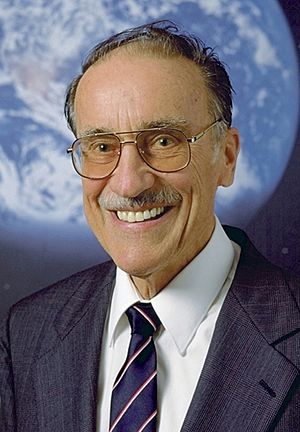Walter Kistler facts for kids
Quick facts for kids
Walter P. Kistler
|
|
|---|---|
 |
|
| Born | 1918 |
| Died | November 2, 2015 (aged 96–97) |
| Nationality | Swiss/USA |
| Alma mater | University of Geneva, ETH Zurich |
| Known for | Multiple inventions, Kistler Group |
| Awards | Albert F. Sperry Award (issued by the ISA) Aerospace Pioneer Award from the AIAA) |
| Scientific career | |
| Fields | Physicist |
| Institutions | Swiss Locomotive and Machine Works, Bell Aircraft |
Walter P. Kistler (1918 – November 2, 2015) was a brilliant scientist, inventor, and a generous person from Biel, Switzerland. He was a physicist, which means he studied how the world works at a very basic level. Kistler was part of important science groups like the Swiss Physical Society, AIAA, and ISA. He even received a special Life Achievement Award in 2000 for his amazing work. He created over 50 inventions in science and industry, and he wrote many articles about his discoveries.
Contents
Walter Kistler's Early Life and Studies
Walter Kistler started his journey by studying science at the University of Geneva. He then earned a master's degree in physics. This was from the Swiss Federal Institute of Technology in Zurich.
New Measurement Tools and Inventions
After his studies, Kistler became the head of the Instrumentation Lab. This was at the Swiss Locomotive and Machine Works in Winterthur. Here, he started a new way to measure things. He used special quartz crystals. These crystals helped create tools like accelerometers, load cells, and pressure gauges.
His big invention was a "charge amplifier." This device could handle very weak signals from the sensors. Thanks to these achievements, he won the Albert F. Sperry Award in 1980. This award came from the Instrument Society of America (ISA).
Kistler's Mid-Life and Company Success
In 1951, Walter Kistler moved to the United States. He joined a company called Bell Aircraft in Buffalo, New York.
Innovations for Space Travel
At Bell Aircraft, Kistler invented a special accelerometer. This tool was later used to guide the Agena space rocket. For this important work, he received the Aerospace Pioneer Award in 1968. This award was from the American Institute of Aeronautics and Astronautics (AIAA). It recognized his early work in creating high-tech tools for space.
Founding the Kistler Instrument Company
In 1954, Kistler decided to start his own company. He named it Kistler Instrument Company. His goal was to continue working on quartz-based instruments. The company officially started in 1957.
Under Kistler's leadership, his company made many big discoveries. Some of these were used in the Apollo space missions. His company became a world leader in making quartz sensors.
New Ventures and Contributions
Kistler sold his company, now known as Kistler Group, in 1968. He then moved to Seattle, Washington. In 1974, he started a new company with his partner, Charles Morse. They called it Kistler-Morse Corporation.
At this new company, Kistler continued to design many new sensors. In 1982, he was named an ISA Fellow. This was for his important work in developing sensors. Kistler also created a shorthand writing system called Steno in the 1960s. He started a project in 1997 to teach this system. He believed Steno would be very useful for writing journals.
Walter Kistler's Later Life and Legacy
In his later years, Walter Kistler was involved with several high-tech startup companies. He served as a director or chairman for companies like Kistler Products, SRS, ICI, Interpoint, Paroscientific, and SPACEHAB, Inc. In 1993, he helped start Kistler Aerospace Corporation. This company aimed to build a reusable space vehicle.
The Foundation For the Future
In 1996, Kistler co-founded the Foundation For the Future with Bob Citron. The main goal of this foundation was to learn more about things that could affect humanity's long-term future.
The Foundation For the Future gives out an award each year called the Kistler Prize. This prize goes to scientists and research groups. It honors those who have made new and important discoveries. These discoveries connect human genetics with human society. The Kistler Prize was last awarded in 2011.

